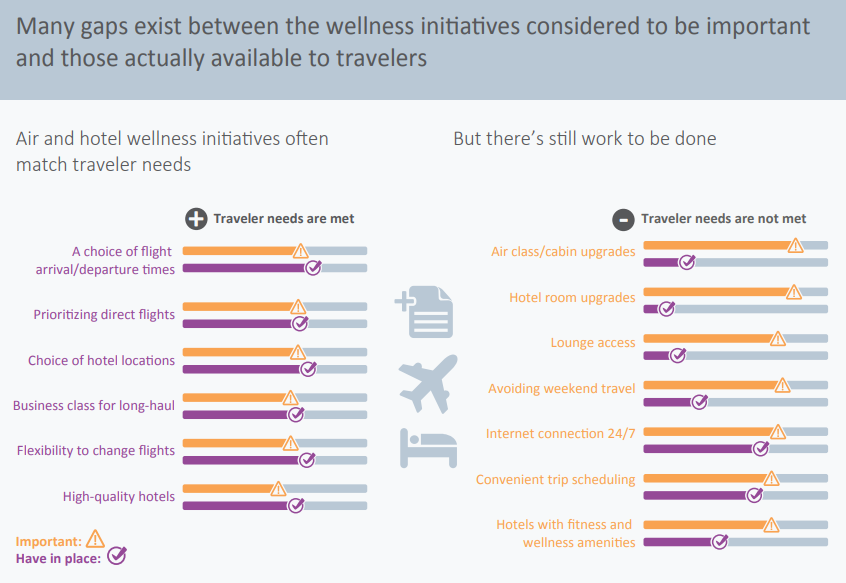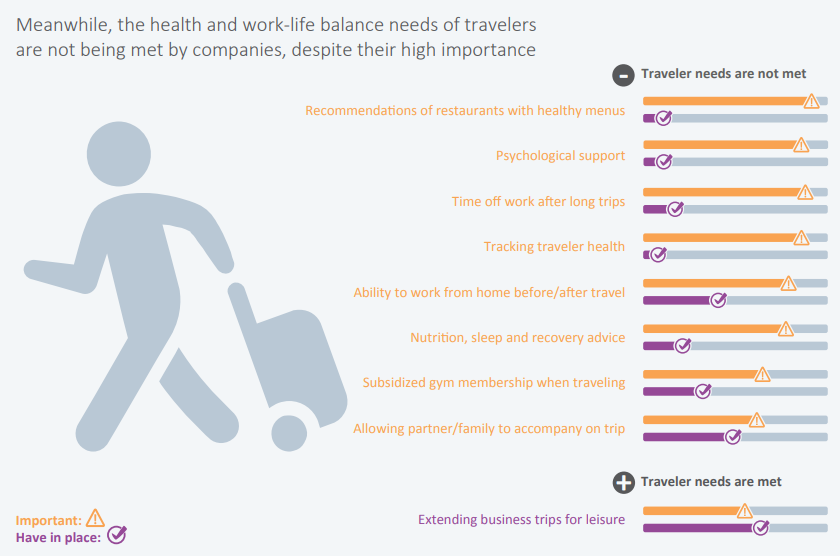The leading travel management company found more than seven in ten respondents (72%) named talent attraction and talent retainment as the number one reason why traveller wellness is important. Nevertheless, traveller wellness is still often neglected in travel policies - Over half (55%) of the respondents indicated their companies have an employee wellness program in place, but only around one in ten (11%) designed a wellness programme for their travellers.

The results of the survey point to a big gap between the wellness initiatives travel managers find important and those that are actually in place, especially when it comes to health and work-life balance. The survey found:
- 95% of respondents rate recommendations for restaurants with healthy menus important but only 14% of companies provide such referrals.
- 90% of respondents think psychological support for travellers is necessary, but only 14% have such support actually in place.
- 90% of respondents believe time-off after a long trip is essential, but only 17% recognise this in their travel policies.
The survey also found there is room for improvement in closing gaps between policy and traveller expectations in the area of air and hotel wellness initiatives:
- More than 83% of the respondents rate aircraft class/cabin upgrades as important, but only 29% of travel policies allow these.
- The situation with hotel upgrades is similarly unbalanced with 82% rating it as important, but only 18% of policies allowing it.
- 78% of respondents state that lounge access is important, but only 22% of companies include that in their travel policy.
- 76% say it's important to avoid traveling over the weekend, yet only 36% made that part of their travel policy.
BCD Travel's Natalia Tretyakevich, senior manager, research and intelligence says the survey highlights that corporate travel is "anything but business as usual" and can be "exhausting" for staff. "Business travellers are faced with the disruptions and uncertainties of navigating unknown territory. Being away from the comforts of familiar surroundings influences their well-being and happiness," she adds.

The research findings reveal that traveller wellness can be achieved by a few actions such as seat upgrades, restaurant recommendations, or offering hotels with fitness amenities. But, with cost control such a key part of the travel management process these such actions could still be seen as a cost too far for programmes.
Jorge Cruz, executive vice president, global sales and marketing at BCD Travel, explains that a stronger traveller wellness policy could ultimately help travel managers "identify opportunities that position their travel programme as a driver of innovation" for the company. "By contributing to a traveller wellness program that keeps frequent travelers such as sales employees satisfied, travel managers can help a company to outperform their competition and thus create an effect much larger than just happy travellers," he says.
BCD Travel says the findings of the survey highlights that making traveller wellness initiatives a part of annual supplier negotiations is important for all businesses moving forward. "Include lounge access and upgrades in your discussions… add hotels that offer fitness and wellness amenities to your programme... add recommendations for healthy food options at the locations most frequented by your travellers," it suggests.
Above all, it recommends that companies measure traveller satisfaction through regular surveys, and incorporate more data sources from third parties, and then not to just sit back, but regularly revisit the travel policy, and include more wellness offerings based on data insights.